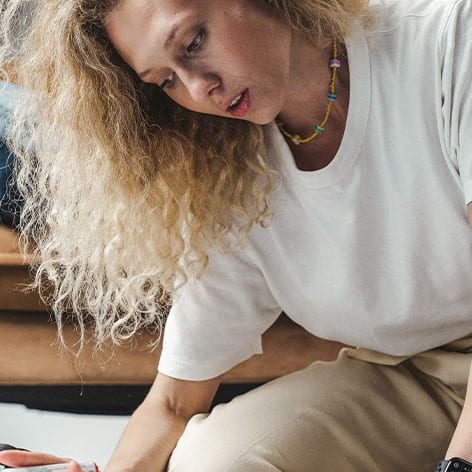blog post
Habits 101: What They Are, How They Work and How to Develop Great Habits

If you want to successfully develop and stick to habits that make you successful, use this methodology to make it happen.

– Mahatma Gandhi
It can take either hardly any time or an extremely long time to develop a new habit. Sometimes it can only take a few seconds and sometimes it can take years. Whatever the habit is, the time it takes to develop it will always be determined by the emotions associated with the habit itself.
A lot of people talk about achieving certain goals – losing weight, making money, growing a successful business. This can go on for weeks, months and even years (without any real progress).
And then, one day – a doctor will tell you you’ll die if you don’t lose weight, or the job that you’ve been in for 15 years terminate your employment. You’re suddenly forced to make a life-changing decision – and a new form of behaviour is triggered for the rest of your life. That behaviour, over time, can translate into a habit.
But what exactly is a “habit”, how do they work, how can you develop one and – most importantly – how can you make those habits stick?
What is a habit?
Put simply, habits are behavioural routines you repeat regularly but that occur subconsciously. In other words, you don’t have to think about engaging in habits. Things like walking the dog, brushing your teeth and eating breakfast in the morning are all examples of common everyday habits.
How do habits work?
Habits form when behaviors become automatic. This usually work in a three-step process.
First, there is a trigger or a cue. This can be a thought, or a belief or some external action.
Example: Your mobile phone notifies you that somebody has commented on a photo that you posted on Facebook.
Second, this cue will set in a motion on a routine.
Example: When you receive a notification, the dopamine hit will trigger a routine of checking your Facebook to see who commented.
Third, the routine will provide you with a reward that you want. This could be a desire you’re craving or a pain that you’re avoiding. The reward is seared into your brain, and facilitates a loop you subconsciously remember into the future.
Example: The pleasure you feel when looking at the Facebook post, and seeing who liked or commented on your photo.
3 types of habits of successful people
Aristotle said that “we are what we repeatedly do”. Being excellent, he said, was therefore not an act – it was a habit. Here are three habits of successful people that all entrepreneurs and business owners should aspire to develop.
The productivity habit
Productivity habits refer to the procedures, processes and routines you do to ‘get things done’ throughout the day. This includes:
- Scheduling your work everyday: Your calendar is your bible. Plan every hour of the day as much as possible, so you can defeat procrastination and never have to think about remembering anything.
- Decluttering: Another great habit is to declutter the physical objects in your life. Set aside a time each week to declutter your environment and apply a ‘clean desk’ policy. Physical clutter can be stressful on the mind, so clear it up as often as you can.
- Reading (a lot): Spend at least half an hour each day on reading – this can be for your education, self-improvement but also your own entertainment.
The physical habit
Physical habits are just as important as your productivity habits. A healthy mind and a healthy body translates into greater levels of productivity.
- Wake up early: as hard as it sounds, approximately 50% of self-made millionaires get out of bed at least three hours before their workday actually starts. They can use this time to work on personal projects, plan the day or head or exercise.
- Exercise is a priority: Working out obviously isn’t just great for your body and physical health, but it also motivates you. Successful business leaders always make sure to work out to the point where it becomes a habit.
- They get enough sleep: A huge number of self-made millionaires (approximately 89%) sleep seven or eight hours each night.
The mental habit
This is the most important habit of them all – as adopting good mental habits will translate into adopting good physical and productivity habits. Some of these mental habits include:
- Positive thinking: successful people are fueled by a can-do attitude. Without optimism, you can’t start a business or even start a family. By thinking positive, you can create the life you want.
- Apply mindfulness at for 30 minutes to 1 hour per day: Mindfulness refers to ‘focus on the now’. Set aside time every day to just think, reflect and focus on the moment.
- Avoiding people who waste your time: this is sort of a productive habit as well as a mental habit, but it’s critical not to waste your time. Be very careful who you spend your time with, and what you spend your time doing. You can get money back, but you’ll never get your time back.
5 Scientifically-Backed Steps to Developing a New Habit (and Making it Stick)

Building habits takes effort and an ounce of creativity. Luckily for most entrepreneurs out there, science provides us with a guide to developing and keeping excellent habits. Below are five steps to developing and sticking to a habit.
- Set a specific goal (not a generalised one)
The first step is to define a specific goal that you want to turn into a habit. The way you define this goal matters tremendously. Abstract and vague goals like “make more money” or “exercise more” don’t help.
Be specific – “make $2,000 this month through my side hustle” or “exercise 30 minutes per day”. These smaller objectives make it much more manageable and less daunting to achieve.
- Build a plan based on cues
Once you’ve got your goal in mind, it’s time to create a detail plan based on “cues” (which we outlined above). Science has shown that you’ll achieve progress towards our goal if you are cued to do it.
For example, a plan such as “exercise 30 minutes per day” is unlikely to work. A detailed plan based on cues such as “exercise 30 minutes per day after my final meeting for the day” is much more likely to become a habit you actually stick to. You’ll also be much less likely to forget it.
- Make it a fun experience (so you want to repeat it)
Most people think that ‘willpower’ is the best way to enforce a new habit. This is simply not true. Willpower is like overusing a muscle, and you run the risk of working it to the point where it can no longer work anymore.
Research indicates that, actually, you’ll achieve much more if you focus on finding ways to make the pursuit of your goals fun.
A great way to do this is to enjoy a particular indulgence that you love in the lead up to working towards your goal. For instance, binge-watching your favourite TV show while exercising or listening to your favourite podcast when eating healthy meals.
- Spice up your routine
As you become fixated on your habits, it’s very easy to fall into a routine that can get dull (even when you inject fun into it). It is important to put some flexibility and variability in your routine.
For example, if you’re goal is to exercise 30 minutes at the end of the day, insert some days where you exercise in the morning or in the middle of the day.
Also, don’t be stressed if there are days where you just can’t execute your habit. You can give yourself what are called “emergency reserves”, which are reserve days to give you flexibility – and miss a day of your new habit.
- Get the right type of support
We are strongly influenced by the people we surround ourselves with. When you surround yourself with people with good habits, and people who are at the level that you want to get to, you’ll be surprised at the results.
That doesn’t mean you have to hang out with crazy people. You don’t need to train with triathlon athletes when all you want to do is work out to a 4K. Sometimes, this can be discouraging,
But generally, by socialising with people who have achieved what you want to achieve, the possibilities truly are limitless!

behind the blog
Renee Minchin
I’m an Australian CFO, accountant, bookkeeper, BAS Agent, and ASIC agent, and I love helping creatives understand their financial and legal responsibilities so they can be protected.
